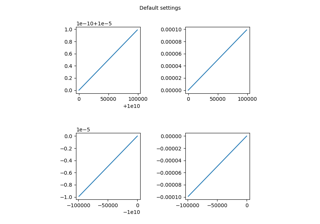matplotlib.axes.Axes.ticklabel_format#
- Axes.ticklabel_format(*, axis='both', style='', scilimits=None, useOffset=None, useLocale=None, useMathText=None)[source]#
Configure the
ScalarFormatterused by default for linear Axes.If a parameter is not set, the corresponding property of the formatter is left unchanged.
- Parameters:
- axis{'x', 'y', 'both'}, default: 'both'
The axis to configure. Only major ticks are affected.
- style{'sci', 'scientific', 'plain'}
Whether to use scientific notation. The formatter default is to use scientific notation.
- scilimitspair of ints (m, n)
Scientific notation is used only for numbers outside the range 10m to 10n (and only if the formatter is configured to use scientific notation at all). Use (0, 0) to include all numbers. Use (m, m) where m != 0 to fix the order of magnitude to 10m. The formatter default is
rcParams["axes.formatter.limits"](default:[-5, 6]).- useOffsetbool or float
If True, the offset is calculated as needed. If False, no offset is used. If a numeric value, it sets the offset. The formatter default is
rcParams["axes.formatter.useoffset"](default:True).- useLocalebool
Whether to format the number using the current locale or using the C (English) locale. This affects e.g. the decimal separator. The formatter default is
rcParams["axes.formatter.use_locale"](default:False).- useMathTextbool
Render the offset and scientific notation in mathtext. The formatter default is
rcParams["axes.formatter.use_mathtext"](default:False).
- Raises:
- AttributeError
If the current formatter is not a
ScalarFormatter.
